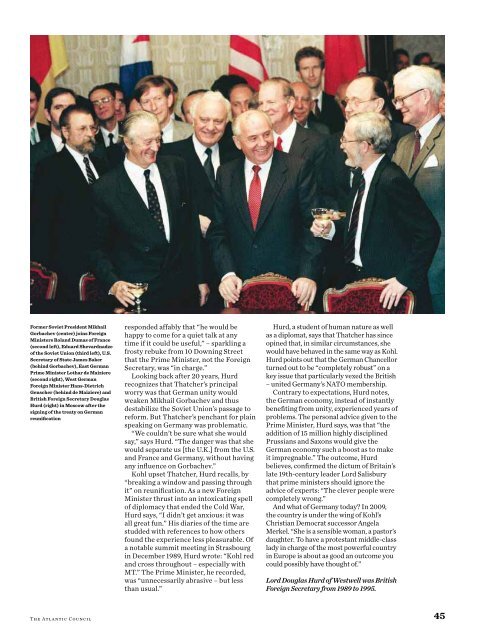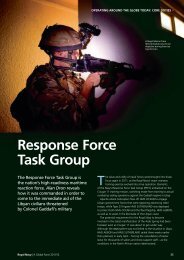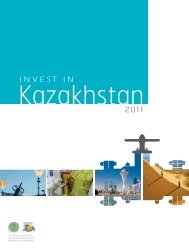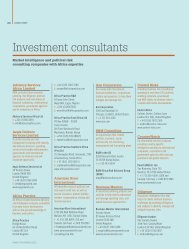NATO – A Bridge Across Time - Newsdesk Media
NATO – A Bridge Across Time - Newsdesk Media
NATO – A Bridge Across Time - Newsdesk Media
You also want an ePaper? Increase the reach of your titles
YUMPU automatically turns print PDFs into web optimized ePapers that Google loves.
Former Soviet President Mikhail<br />
Gorbachev (center) joins Foreign<br />
Ministers Roland Dumas of France<br />
(second left), Eduard Shevardnadze<br />
of the Soviet Union (third left), U.S.<br />
Secretary of State James Baker<br />
(behind Gorbachev), East German<br />
Prime Minister Lothar de Maiziere<br />
(second right), West German<br />
Foreign Minister Hans-Dietrich<br />
Genscher (behind de Maiziere) and<br />
British Foreign Secretary Douglas<br />
Hurd (right) in Moscow after the<br />
signing of the treaty on German<br />
reunification<br />
The Atlantic Council<br />
Pit quam si Igna feu<br />
faccum onullum<br />
Rostiscil elisit dionulla con henim<br />
digna facil diat lortie magnit ad et,<br />
responded affably that “he would be<br />
happy to come for a quiet talk at any<br />
time if it could be useful,” <strong>–</strong> sparkling a<br />
frosty rebuke from 10 Downing Street<br />
that the Prime Minister, not the Foreign<br />
Secretary, was “in charge.”<br />
Looking back after 20 years, Hurd<br />
recognizes that Thatcher’s principal<br />
worry was that German unity would<br />
weaken Mikhail Gorbachev and thus<br />
destabilize the Soviet Union’s passage to<br />
reform. But Thatcher’s penchant for plain<br />
speaking on Germany was problematic.<br />
“We couldn’t be sure what she would<br />
say,” says Hurd. “The danger was that she<br />
would separate us [the U.K.] from the U.S.<br />
and France and Germany, without having<br />
any influence on Gorbachev.”<br />
Kohl upset Thatcher, Hurd recalls, by<br />
“breaking a window and passing through<br />
it” on reunification. As a new Foreign<br />
Minister thrust into an intoxicating spell<br />
of diplomacy that ended the Cold War,<br />
Hurd says, “I didn’t get anxious: it was<br />
all great fun.” His diaries of the time are<br />
studded with references to how others<br />
found the experience less pleasurable. Of<br />
a notable summit meeting in Strasbourg<br />
in December 1989, Hurd wrote: “Kohl red<br />
and cross throughout <strong>–</strong> especially with<br />
MT.” The Prime Minister, he recorded,<br />
was “unnecessarily abrasive <strong>–</strong> but less<br />
than usual.”<br />
Hurd, a student of human nature as well<br />
as a diplomat, says that Thatcher has since<br />
opined that, in similar circumstances, she<br />
would have behaved in the same way as Kohl.<br />
Hurd points out that the German Chancellor<br />
turned out to be “completely robust” on a<br />
key issue that particularly vexed the British<br />
<strong>–</strong> united Germany’s <strong>NATO</strong> membership.<br />
Contrary to expectations, Hurd notes,<br />
the German economy, instead of instantly<br />
benefiting from unity, experienced years of<br />
problems. The personal advice given to the<br />
Prime Minister, Hurd says, was that “the<br />
addition of 15 million highly disciplined<br />
Prussians and Saxons would give the<br />
German economy such a boost as to make<br />
it impregnable.” The outcome, Hurd<br />
believes, confirmed the dictum of Britain’s<br />
late 19th-century leader Lord Salisbury<br />
that prime ministers should ignore the<br />
advice of experts: “The clever people were<br />
completely wrong.”<br />
And what of Germany today? In 2009,<br />
the country is under the wing of Kohl’s<br />
Christian Democrat successor Angela<br />
Merkel. “She is a sensible woman, a pastor’s<br />
daughter. To have a protestant middle-class<br />
lady in charge of the most powerful country<br />
in Europe is about as good an outcome you<br />
could possibly have thought of.”<br />
Lord Douglas Hurd of Westwell was British<br />
Foreign Secretary from 1989 to 1995.<br />
45







